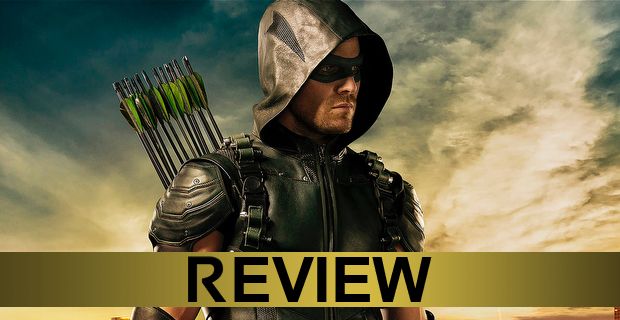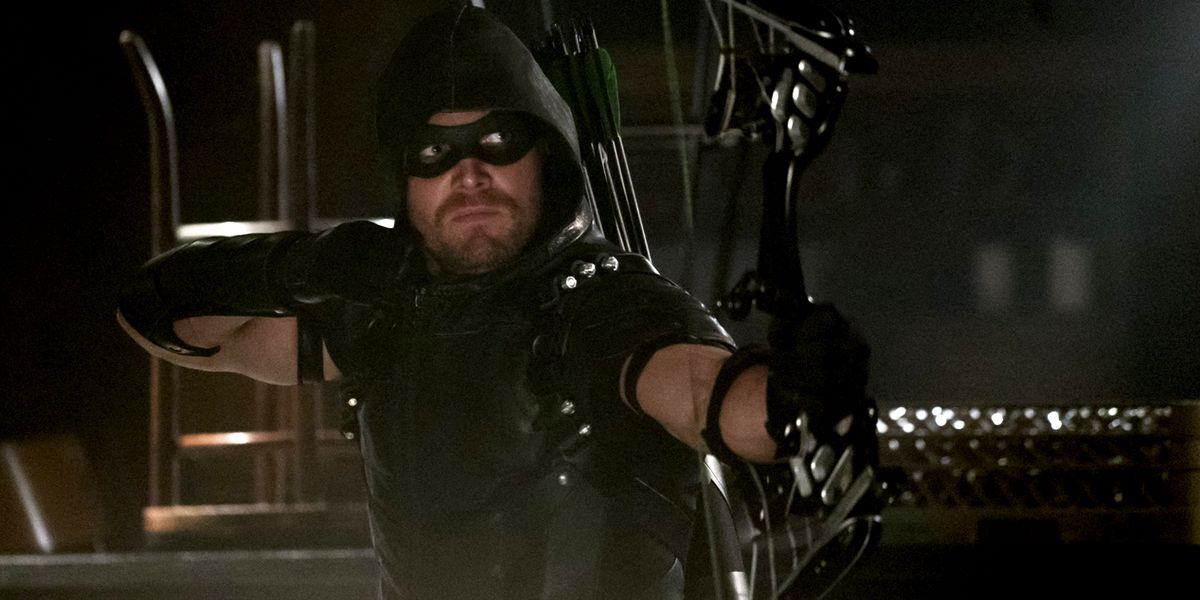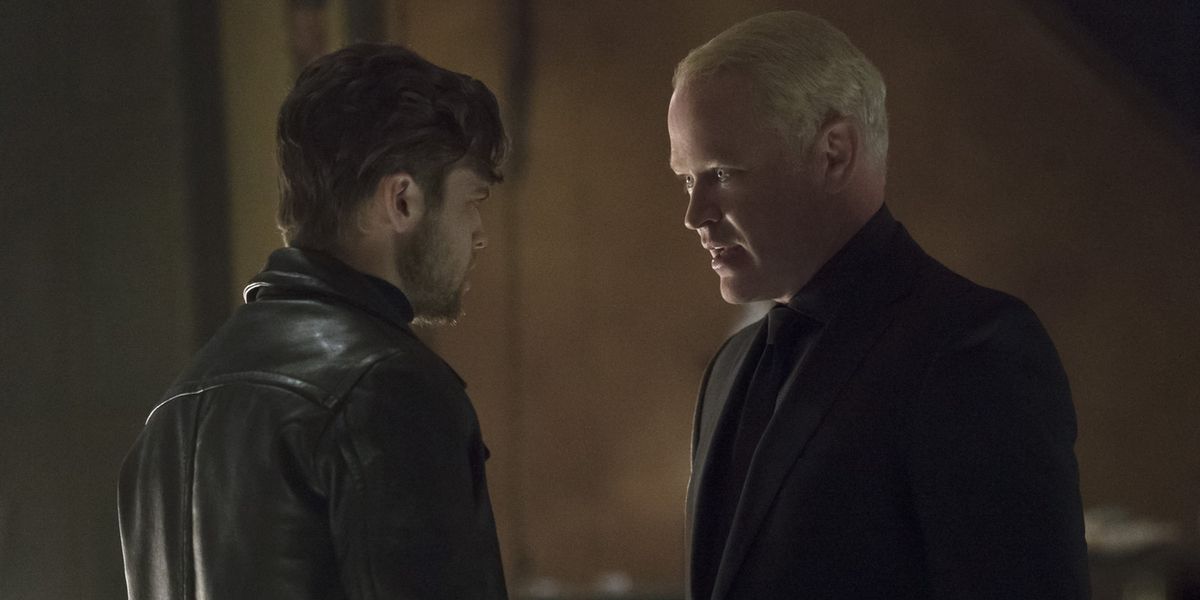[This is a review of Arrow season 4, episode 2. There will be SPOILERS.]
-
Even though Star City continues to falter, businesses like Palmer Technologies are left with little recourse but to implement a redundancy plan, and the city can't even find someone suicidal enough to run for mayor, Arrow manages to feel more buoyant than ever. Maybe that has something to with the way the story isn't riding entirely on the darker side of Oliver's emotional spectrum, or maybe it has something to do with the way Stephen Amell smiles his way through diffusing a bomb (with an aerosol, apparently), all while listening to Felicity ramble on about her and Diggle's need for codenames. Then again, it probably has more to do with Oliver's purchase of a "first day as a boss fern" and the sack lunch he prepared for his girlfriend.
That is to say, for a show that promised it would turn over a new leaf come season 4, Arrow has (in only two episodes, but still) managed to be fairly convincing in its tonal aspirations. And while 'The Candidate' is a busy, perhaps overstuffed affair for much of the hour, it finds success in the altered dynamics of Team Arrow, as well as the continued presence of Damien Darhk.
The episode manages to do this despite introducing a whole host of new characters. Two of them, Jeri Ryan as mayoral candidate and Queen family friend Jessica Danforth, and her daughter Madison (Tiera Skovbye), are mere plot devices – a shame, considering Ryan is a convincing analogue for Moira – while the other two, Echo Kellum's Curtis Holt, a.k.a. Mr. Terrific and Lonnie Machin, a.k.a. Anarky (Alexander Calvert) are being set up to contribute more to the seasons' overall storyline. It is a lot to take in, especially when Machin's story begins to crossover with the Danforths', but even still, the juggling of new names, and reasons for the characters' introductions comes together in a surprisingly effective way.
Perhaps the most effective way is that, despite spending the hour chasing Machin – who is freelancing for Darhk in a bid to win a spot at the bad guys' table – and ostensibly participating in the fiery genesis of Anarky, Oliver manages to hear what it is that Jessica is saying, when she talks about Star City's need for hope beyond a group of masked vigilantes. In a way, Oliver realizing that his next step is to run for mayor of Star City isn't just the comic books bleeding over into the television series; it actually works to give the show a new angle from which to examine the long-term effects of its storytelling choices.
After demonstrating time and time again just how lethal Star City can be for those who dare assume a role in its leadership, Arrow is in the position to pay off a series of character deaths in a way that can carry significant weight. Oliver's decision to become the city's leader works as an extension of his character's shifting perspective, one that is seen again when he finally confronts Thea about her tendency to slip into a berserker rage. But the Oliver-as-mayoral-candidate thread also works to the advantage of the series' setting. The idea the city has lost so many leaders the position is now considered a literal death sentence works as a profound statement on just how far the city has fallen in spite of Team Arrow's efforts. Oliver may be wildly inexperienced when it comes to actually running a city, but the symbolic nature of his endeavor is as meaningful (if not more so) as any arrow he's launched in the name of justice.
But again, it's all part and parcel of Arrow changing its tune. Whereas old Oliver might have responded by punishing himself over the assassination attempt on Danforth, her daughter's kidnapping, and the subsequent withdrawal of her mayoral candidacy, new Oliver takes the sort of action that needn't be done under the cover of darkness. In other words, Arrow is taking that lighter tone literally, by putting its titular character's civilian persona directly in the political spotlight.
That doesn't mean the show has abandoned its gritty, darker tones entirely. It does have a character with Darhk as his surname, after all. Additionally, there is the aforementioned problem with Thea, which, mercifully, the series allows the characters to actually attempt to handle, rather than sweep it under the rug or avoid discussion of until it boils over and threatens everyone. Again, old Oliver would have convinced himself that not telling his sister a magic hot tub made her a rage-filled hate tank was the only choice he had, whereas new Oliver opens up and makes the problem the actual discussion, rather than forcing the lack of discussion to become the main talking point.
The narrative benefits from this approach because it gives characters a purpose outside of servicing Oliver's emotional needs. Like Felicity's ongoing troubles as new CEO of Palmer Technologies, and the last-ditch effort to hedge her bets on Holt's brainpower as a way of circumventing redundancies, Thea and Laurel's impromptu excursion to Nanda Parbat affords them the sort of independence from which compelling storylines are born. Sure, given the promos for Legends of Tomorrow, the journey to resurrect Sara is really more a necessity of brand extension than anything else, but even if they are being asked to fill in the blanks on a show that hasn't even aired yet, it is reassuring to see the series offer its supporting characters something to do.
In all, 'The Candidate' is a solid follow-up to last week's self-assured premiere. There is more table setting here than anything else, but from Neal McDonough's engaging presence as the big bad to Oliver's attempt to become an actual beacon of hope to the (temporary) death of Oliver's horrible flashback wig, the season is off to a positive start.
-
Arrow continues next Tuesday with 'Restoration' @8pm on The CW. Check out a preview below:



